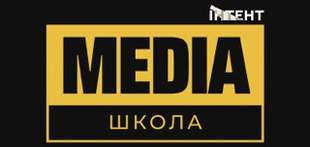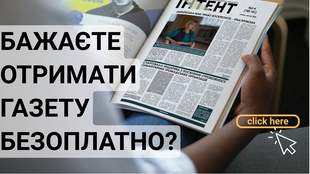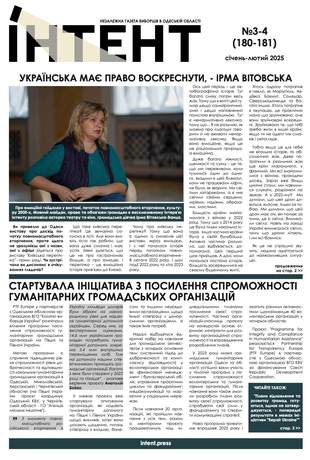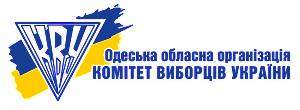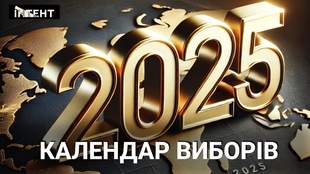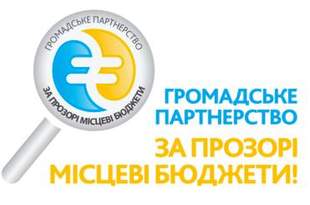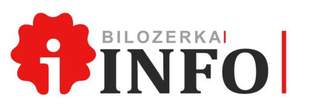Меню
Social networks
May 17, 2025, 7:57 a.m.
A Wobbly Neighbor: Why the Romanian Presidential Election is Critically Important for Ukraine
Цей матеріал також доступний українською47
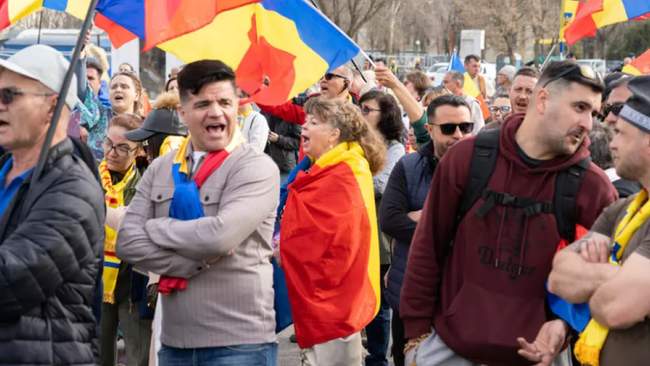
Photo: Eduard Vasilica/RFI Romania
Romania is at a crossroads between democratic values and new political challenges. On May 4, the country held the first round of presidential elections in the second attempt. Before the May 18 vote, the situation is ambiguous and very important for Ukraine. Read more in Intent's material from the series " Electoral Systems of the World".
Political system in Romania
Romania is a republican state with a republican form of government with the division of power into legislative, executive and judicial branches.
The head of state is the president, who is elected by popular vote for a 5-year term. The president represents the state and is the guarantor of independence, unity, territorial integrity and the constitution.
He has the right to appoint the prime minister, call referendums, and is the commander-in-chief of the armed forces, but his powers in domestic politics are limited.
In the event of resignation or inability to fulfill his duties, the President of the Senate temporarily assumes them.
The head of government is the prime minister. He or she is appointed by the president after the approval of both houses of parliament. He or she heads the executive branch, forms the government and coordinates its work.
The Parliament is bicameral, consisting of the Chamber of Deputies and the Senate. Legislative power is vested in the Parliament, which is elected on the basis of a proportional representation system.
Parliament approves the government, adopts laws, and controls the executive branch.
Electoral system in Romania
Romania uses a two-round majority system of absolute majority to elect the president. This means that to win the first round, a candidate must receive more than 50% of the vote. If no candidate reaches this threshold, a second round is held between the two candidates who received the most votes in the first round.
Romanian citizens who have reached the age of 18 may participate in the elections. Romanians living abroad can vote for three days.
Parliamentary elections are held under a proportional system with closed party lists.
About 19,000 polling stations are opening in the country, and almost 18 million registered voters are eligible to vote.
Prerequisites for the 2025 presidential election
The presidential election in Romania, held on November 24, 2024, was to continue with a second round on December 8, as no candidate won an absolute majority. However, on December 6, the Romanian Constitutional Court canceled the results of the first round, citing alleged Russian-like interference in the electoral process.
The results of the first round came as a surprise. Far-right and pro-Russian candidate Kelin Georgescu received the largest number of votes, while liberal politician Elena Lasconi came in second. The key topics of the election were corruption, LGBT rights, the role of Christianity in society, and the war between Russia and Ukraine.
After the first round, disputes arose that led to a political crisis. President Klaus Iohannis accused the Georgescu campaign of being backed by Russia. Following allegations of voting fraud, the Constitutional Court initially ordered a recount. However, on December 6, after the declassification of intelligence documents about Russian interference, the court canceled the results of the first round.
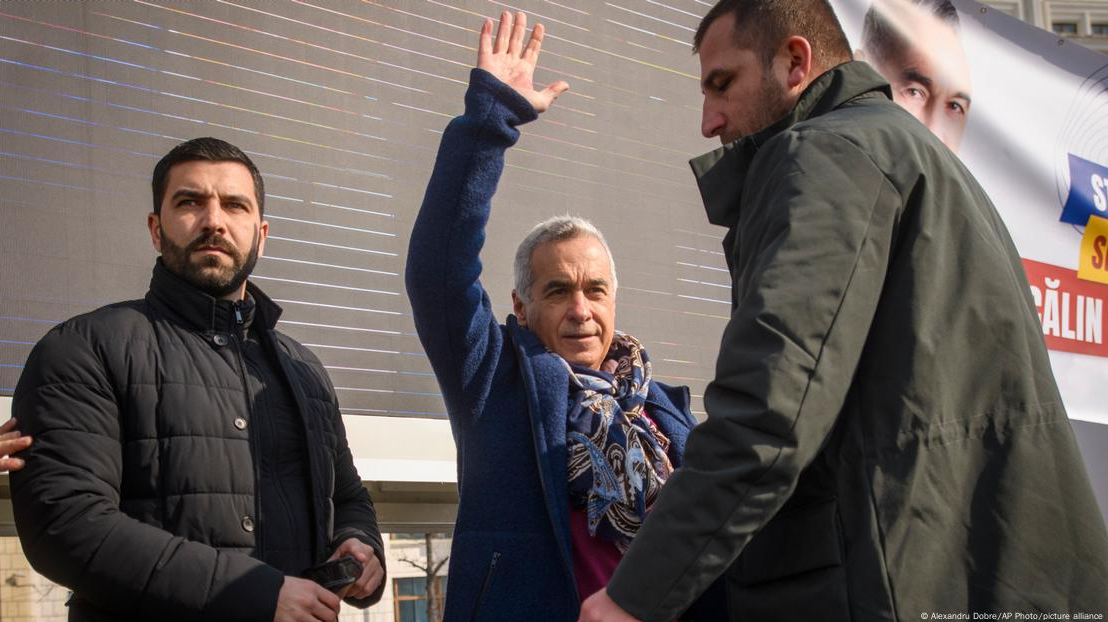
Kelin Georgescu. Photo: Alexandru Dobre/AP Photo/picture alliance
On February 26, 2025, police stopped Kelin Georgescu while he was driving. According to reports, he was on his way to submit documents to run for president. He was charged with six offenses, including incitement to actions that threaten the constitutional order, as well as links to fascist organizations.
The authorities imposed preventive restrictions on him: Georgescu was placed under judicial control and also received a 60-day ban on spreading xenophobic and anti-Semitic statements on social media. During searches in the house of the politician's bodyguard, police found $10 million hidden underground, as well as airline tickets to Moscow.
On March 7, Georgescu submitted his candidacy to the Central Election Bureau. But on March 9, his registration was officially rejected. As a result, on March 14, Gheorghe Simion appeared at the Central Election Commission.
Elections in 2025
The first round of elections took place on May 4. It was won by nationalist and Donald Trump fan George Simion, who received 40.5% of the vote, BBC Ukraine reports. Simion said that if he wins, he could bring to power the suspended pro-Russian candidate Kelin Georgescu, who caused the previous election to be canceled. The SBU confirmed to BBC Ukraine that Simion had previously been banned from entering Ukraine for anti-Ukrainian activities.
George Simion
Simion's biography and political career show that his statements, as well as his predictability, should be taken with caution, DW writes. The 38-year-old politician began his career almost two decades ago as a soccer hooligan, and shortly after as an ultranationalist calling for the unification of all Romanians in "Greater Romania." This includes the Republic of Moldova and parts of present-day Ukraine, including northern Bukovina. Because of these demands, he has been banned from entering the Republic of Moldova since 2014 and Ukraine since 2020.
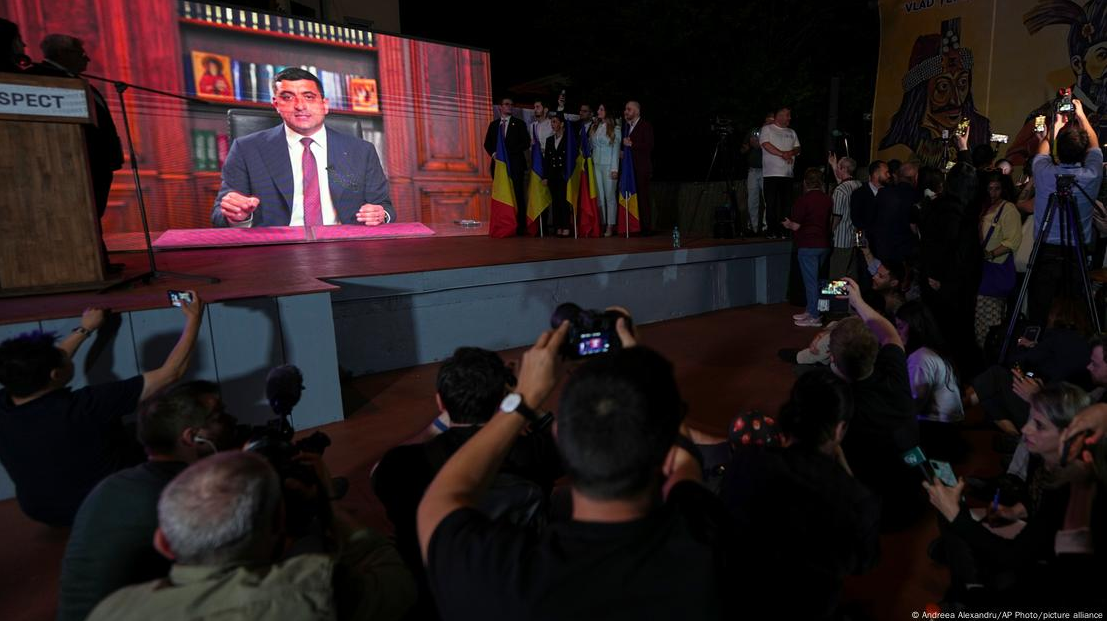
George Simion. Photo: Andreea Alexandru/AP Photo/picture alliance
Simion may also have ties to the Russian FSB intelligence service, as stated, among others, by former Moldovan Defense Minister Anatol Salaru, who, in turn, cited Moldovan and Ukrainian intelligence sources. Simion reportedly met with an FSB agent in Chernivtsi, Ukraine, at least once in 2011. There is no clear evidence of Simon's ties to the FSB. However, one of the leading representatives of Russian Eurasian fascist ideology, Alexander Dugin, has repeatedly expressed his support for Simion, as well as for Romanian right-wing extremists in general.
Nicuşor Dan
In second place by a huge margin was the technocrat and current mayor of Bucharest, Nicuşor Dan, with 20.07%.
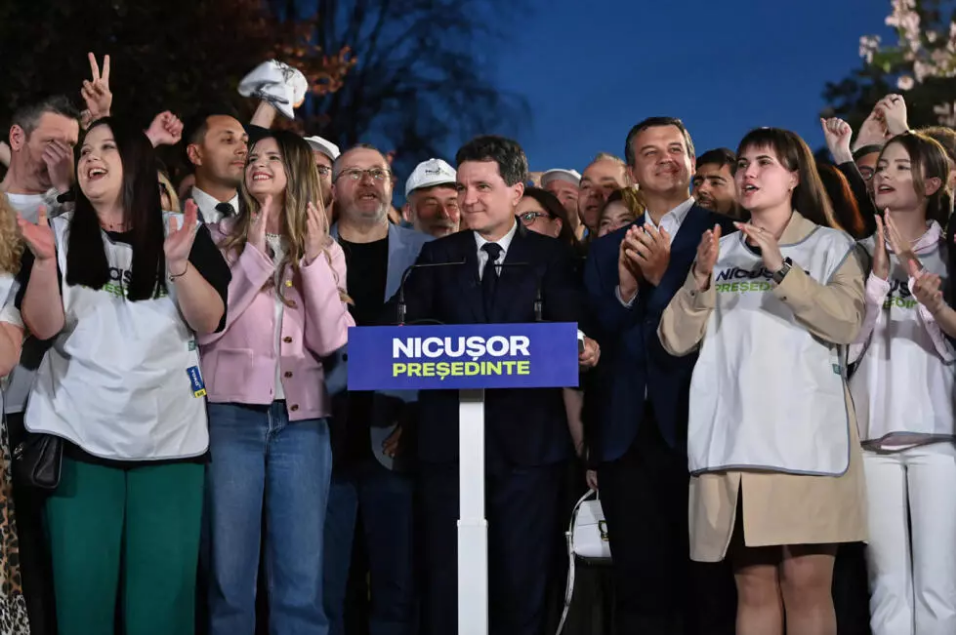
Nicuşor Dan. Photo: Eduard Vinatoru/AP
Bucharest Mayor Nicuşor Dan is a progressive-liberal politician, currently non-partisan, DW reports. The politician became known as an active fighter against the dominance and omnipotence of the Bucharest mafia, which firmly held the real estate market in its hands, and co-founder of the green-liberal protest party "Save Romania Union" (USR), could help Romania move forward. Dan, a mathematician, has a reputation for honesty and integrity, but he has not been very successful as mayor because he is up against a powerful apparatus. Unlike Antonescu, he is in favor of unconditional support for Ukraine.
Dan speaks calmly and poisedly, and is seen as a balanced, rational, and non-conflictual politician who approaches problems analytically and seeks to achieve long-term solutions. He is also considered close to the people. For example, he made the main entrance to Bucharest City Hall, which had been closed for decades and opened only for certain ceremonies, freely accessible.
Nicusor Dan's direct speech about the situation in Ukraine is published by RFI: "Europe and the world have had 80 years of peace, and now we have Russia, an aggressor state that has invaded Ukraine. We are part of international treaties, and since this movement could lead to territorial claims that would bring us back to war, which obviously no one wants, we have to help a state that is part of the world order that has brought prosperity. In addition, if we talk about the war in Ukraine, let's not forget that Ukraine's neighbor is the Republic of Moldova, where our compatriots are located. So, a possible surrender of Ukraine would mean Russia in the Republic of Moldova."
Chances before May 18
The second round of the Romanian presidential election will be held on May 18 and seems likely to be much more dramatic than the first, RFI writes.
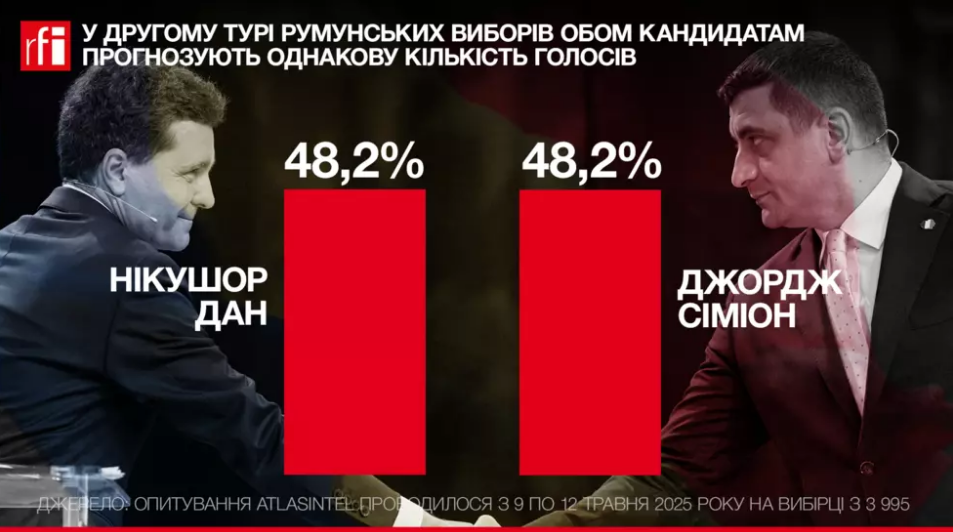
Image: HotNews/Graphic by RFI
The situation is dynamic and it is still difficult to say for sure who will eventually win. However, sociologists are modeling the situation.
Thus, sociologist Remus Stefuriak, director of INSCOP Research, believes that the turnout in the second round of elections will be 10-13% higher than in the first round. This means that Romanian society is mobilizing.
And according to the AtlasIntel poll, George Simion and independent candidate Nicușor Dan have parity: each of them can win 48.2% of the vote in the second round of the presidential election. 2.6% of respondents have not yet decided who they will vote for.
We can state that the whole of Europe is now focused on Romania. George Simion's victory will mean the strengthening of the Orban-Fico bloc in the EU, if Nicușor Dan is elected, the foreign policy course of the neighbors is unlikely to change, and Ukraine will not get a politician who is clearly sympathetic to Moscow at the head of this state.
It is significant that Moldovan President Maia Sandu expressed support for Bucharest Mayor Nicușor Dan in the second round. This was reported by Yevropeiska Pravda.
According to Sandu, she hopes for a "European and strong Romania" that will remain close to Moldova on its European path.
"We really want to continue to have very good relations with Romania. I will personally support Nicușor Dan," the Moldovan president said.
